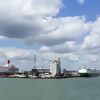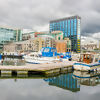14 Nights | 14-DAY ICELAND, IRELAND & NORWAY: MYSTICAL FJORDS
About Dublin South, Ireland
You will visit the following 9 places:

Belfast
Belfast (meaning: "mouth of the sandbanks") is the capital and largest city of Northern Ireland, the second-largest city in Ireland after Dublin, and is situated around the River Lagan, which runs through the city. It is a port city known as the birthplace of the RMS Titanic, and for its political murals, documenting the ‘Troubles’ of the 20th century. Today, Belfast remains a centre for industry, as well as the arts, higher education, business, and law, and is the economic engine of Northern Ireland. The city suffered greatly during the period of conflict called "the Troubles", but latterly has undergone a sustained period of calm, free from the intense political violence of former years, and substantial economic and commercial growth. Additionally, Belfast city centre has undergone considerable expansion and regeneration in recent years, notably around Victoria Square.

Southampton
Southampton is the largest city in the county of Hampshire on the south coast of England, and is situated 120 kilometres (75 mi) south-west of London and 30 kilometres (19 mi) north-west of Portsmouth. Southampton is a major port and the closest city to the New Forest. It lies at the northernmost point of Southampton Water at the confluence of the River Test and River Itchen, with the River Hamble joining to the south of the urban area. The local authority is Southampton City Council, which is a unitary authority. Just over a quarter of the jobs available in the city are in the health and education sector. A further 19 per cent are property and other business and the third largest sector is wholesale and retail, which accounts for 16.2 percent. Between 1995 and 2004, the number of jobs in Southampton has increased by 18.5 per cent. Southampton has always been a port, and the docks have long been a major employer in the city. In particular, it is a port for cruise ships; its heyday was the first half of the 20th century, and in particular the inter-war years, when it handled almost half the passenger traffic of the UK. Today it remains home to luxury cruise ships, as well as being the largest freight port on the Channel coast and fourth largest UK port by tonnage, with several container terminals. Unlike some other ports, such as Liverpool, London, and Bristol, where industry and docks have largely moved out of the city centres leaving room for redevelopment, Southampton retains much of its inner-city industry.

Reykjavik
Reykjavík is the capital and largest city of Iceland. It has a latitude of 64°08' N, making it the world's northernmost capital of a sovereign state, and is a popular tourist destination. It is the heart of Icelands's cultural, economic and governmental activity. The city itself is spread out, with sprawling suburbs. The city centre, however, is a very small area characterized by eclectic and colourful houses, with good shopping, dining, and drinking.

Dublin South
Dublin is the largest and capital city of Ireland. The English name is derived from the Irish name Dubh Linn, meaning "black pool". It is a primate city with an urban population of over 1 million, containing almost 25% of the country's population. Dublin is situated near the midpoint of Ireland's east coast, at the mouth of the River Liffey, and at the centre of the Dublin Region. The city is listed by the Globalization and World Cities Research Network (GaWC) as a global city, with a ranking of "Alpha-", placing it among the top thirty cities in the world. It is a historical and contemporary centre for education, the arts, administration, economy and industry.

Bergen
Bergen is the second largest city in Norway with a population of 261,600 as of April 31, 2011. Bergen is the administrative centre of Hordaland county. Greater Bergen or Bergen Metropolitan Area as defined by Statistics Norway, has a population of 386,900 as of April 31, 2011. Bergen is located in the county of Hordaland on the south-western coast of Norway. It is an important cultural hub in its region, recognized as the unofficial capital of Western Norway and sometimes also referred to as the Atlantic coast capital of Norway. The city was one of nine European cities honoured with the title of European Capital of Culture in the Millennium year.

Flåm

Geiranger

Akureyri











